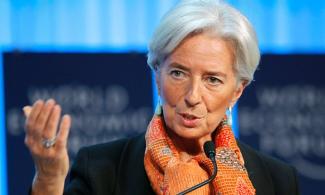
Christine Lagarde, the Managing Director of the International Monetary Fund (IMF), arrived in Abuja on Monday to begin her four-day visit to Nigeria.
Christine Lagarde, the Managing Director of the International Monetary Fund (IMF), arrived in Abuja on Monday to begin her four-day visit to Nigeria.

Her visit is part of a two-nation tour of West Africa, Cameroon is the second country, in order to engage policymakers and top officials on the economic development issues affecting the two countries and the region as a whole.
Before Mrs. Lagarde, the IMF issued a statement intended to underline the organization's commitment to the African continent.
“The visit to Nigeria will provide an opportunity to strengthen the IMF’s partnership with the largest economy in Sub-Saharan Africa,” the statement read in part.
Throughout her four-day stay in Nigeria, Mrs. Lagarde will meet with President Muhammadu Buhari, the Minister of Finance, Kemi Adeosun, and Central Bank of Nigeria (CBN) Governor, Godwin Emefiele as well as members of the National Assembly, top business leaders, and civil society representatives.
“Nigeria is working hard to improve its business environment, promote opportunities for growth in the private sector, and to strengthen its social cohesion, all of which are areas where the government has an important role to play,” the IMF director noted.
Mrs. Lagarde explained that her discussions would focus on the economic issues affecting Nigeria, in particular, the impact of declining oil prices.
The IMF has been critical of the decision by CBN Governor Emefiele to restrict access to foreign exchange in a bid to strengthen the Naira and stabilize the Nigerian economy. Mr. Emefiele also removed 41 items from Nigeria's import list.
According to the Director of the IMF’s Africa Department, Antoinette Sayer, these efforts have been detrimental to the nation’s economy and have weakened rather than strengthened the Naira.
“It [CBN’s actions] is not something we think is sustainable or advisable. We hope that there will be an opportunity to review those restrictions and permit the exchange rate to continue to adjust,” Mr. Sayer stated.
These comments, as well as other indicators, caused many observers to note that CBN policy along with falling oil prices will be among the primary talking points brought up by IMF Director Lagarde.